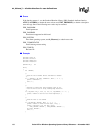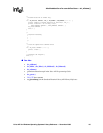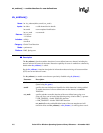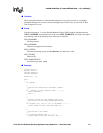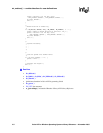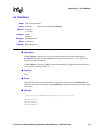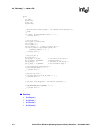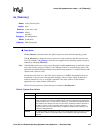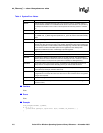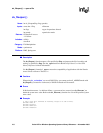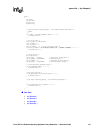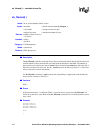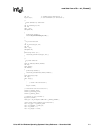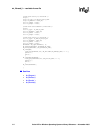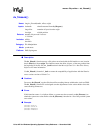
206 Voice API for Windows Operating Systems Library Reference — November 2003
dx_fileerrno( ) — return the system error value
!
!!
! Cautions
None.
!
!!
! Errors
None.
!
!!
! Example
rc=dx_fileopen(FileName, O_RDONLY);
if (rc == -1) {
printf('Error opening %s, system error: %d\n", FileName, dx_fileerrno( ) );
}
EBADF Bad file number; invalid file descriptor (file is not opened for writing). Possible causes: 1)
The specified file handle is not a valid file-handle value or does not refer to an open file. 2)
An attempt was made to write to a file or device opened for read-only access or a locked
file.
EDOM Math argument.
EEXIST Files exist. An attempt has been made to create a file that already exists. For example, the
_O_CREAT and _O_EXCL flags are specified in an _open call, but the named file already
exists.
EINTR A signal was caught.
EINVAL Invalid argument. An invalid value was given for one of the arguments to a function. For
example, the value given for the origin or the position specified by offset when positioning a
file pointer (by means of a call to fseek) is before the beginning of the file. Other possibilities
are as follows: The dev/evt/handler triplet was not registered or has already been
registered. Invalid timeout value. Invalid flags or pmode argument.
EIO Error during a Windows open.
EMFILE Too many open files. No more file handles are available, so no more files can be opened.
ENOENT No such file or directory; invalid device name; file or path not found. The specified file or
directory does not exist or cannot be found. This message can occur whenever a specified
file does not exist or a component of a path does not specify an existing directory.
ENOMEM Not enough memory. Not enough memory is available for the attempted operation. The
library has run out of space when allocating memory for internal data structures.
ENOSPC Not enough space left on the device for the operation. No more space for writing is available
on the device (for example, when the disk is full).
ERANGE Result too large. An argument to a math function is too large, resulting in partial or total loss
of significance in the result. This error can also occur in other functions when an argument
is larger than expected.
ESR_TMOUT Timed out waiting for event.
EXDEV Cross-device link. An attempt was made to move a file to a different device (using the
rename function).
Table 4. System Error Values
Value Description



